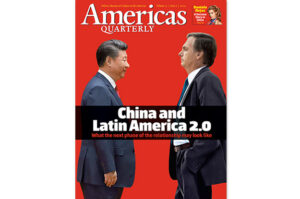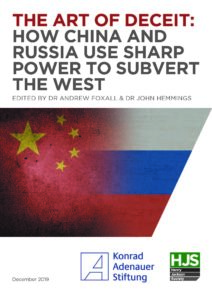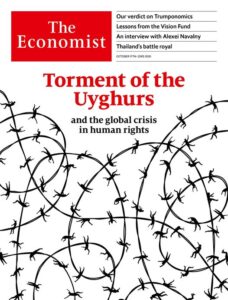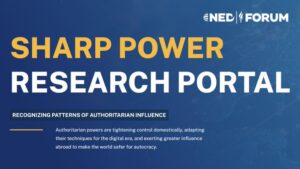Leftist gains in Latin American elections could buoy China and undermine the United States as they compete for regional influence, analysts say, with a new crop of Latin American leaders who are desperate for economic development and more open to Beijing’s global strategy of offering loans and infrastructure investment. The change could also make it harder for the United States to continue isolating authoritarian leftist regimes in Venezuela, Nicaragua and Cuba, The New York Times reports:
Eric Hershberg, the director of the Center for Latin American and Latino Studies at American University, said the left’s winning streak is born out of widespread indignation. “This is really about lower-middle-class and working-class sectors saying, ‘Thirty years into democracy, and we still have to ride a decrepit bus for two hours to get to a bad health clinic,’” Mr. Hershberg said. He cited frustration, anger and “a generalized sense that elites have enriched themselves, been corrupt, have not been operating in the public interest.”
“The Chinese don’t say ‘We want to take over Latin America’, but they clearly set out a multidimensional engagement strategy, which, if successful, would significantly expand their leverage and produce enormous intelligence concerns for the United States,” US Army War College research professor Evan Ellis, a former member of the State Department policy planning staff, told the Washington Examiner.
 In his memory there had never been a Latin America “as dominated by a combination of leftists and anti-U. S. populist leaders,” Ellis told the Times. “Across the region, leftist governments will be particularly willing to work with the Chinese on government-to-government contracts,” he said, and possibly “with respect to security collaboration as well as technology collaboration.”
In his memory there had never been a Latin America “as dominated by a combination of leftists and anti-U. S. populist leaders,” Ellis told the Times. “Across the region, leftist governments will be particularly willing to work with the Chinese on government-to-government contracts,” he said, and possibly “with respect to security collaboration as well as technology collaboration.”
China’s engagement with the region has grown significantly since 2001, particularly in terms of
diplomatic and economic ties, reflecting its global “soft power” efforts and “influence operations” worldwide, says a recent Congressional Research Service report. A succession of Chinese leaders and other officials have visited the region to court governments. In turn, regional leaders and officials have frequently visited China. The PRC has signed various bilateral partnership agreements with countries throughout LAC, including “comprehensive strategic partnerships” with Argentina, Brazil, Chile, Ecuador, Mexico, Peru, and Venezuela.
Political discourse among many Western commentators reveals a marked reluctance to confront the changed political realities of Xi Jinping’s hard authoritarian China and the Chinese Communist Party’s (CCP) ambition to neutralize independent thought and undermine democratic institutions, according to a new analysis.

National Endowment for Democracy (NED)
The University of Nottingham’s Andreas Fulda draws on the literature on sharp power, hybrid interference, the United Front system and Beijing’s globalizing censorship regime to argue that the CCP’s rule by fear has induced self-censorship among many Western academics and other analysts. He identifies at least six public discourses which obscure rather than illuminate how German state and society should respond to the CCP’s hybrid interference, including:
- Playing down valid empirical evidence of victimization/oppression in order to appease Chinese authorities.
- Trivializing the significance of anti-democratic CCP edicts, antiliberal CCP policies and/or anti-democratic party edicts.
- Recommending “silent diplomacy” whilst keeping tight-lipped about obstacles to dialogue.
- Acknowledging political censorship without offering practical and applicable solutions. RTWT
His argument builds on the case he and David Missal made in Foreign Policy that “German Academic Freedom Is Now Decided in Beijing” and cites several sources from the National Endowment for Democracy, including Compromising the Knowledge Economy. Authoritarian Challenges to Independent Intellectual Inquiry; Christopher Walker’s “What is ‘Sharp Power’?” Journal of Democracy, July 2018, and his “The ‘CAMP’ sectors and the threat from sharp power.” Power 3.0 Understanding Modern Authoritarian Influence.
 Xi is copying Putin’s international playbook, says analyst Peter Jennings. Both leaders take big international risks—consider Russia’s military intervention in Syria and China’s authoritarian crackdown in Hong Kong—both have championed vast and rapid military build-ups, and both threaten the use of military force to press for Western acquiescence. Autocratic bluff and brinkmanship can and do produce democratic backdowns, he writes for The ASPI Strategist.
Xi is copying Putin’s international playbook, says analyst Peter Jennings. Both leaders take big international risks—consider Russia’s military intervention in Syria and China’s authoritarian crackdown in Hong Kong—both have championed vast and rapid military build-ups, and both threaten the use of military force to press for Western acquiescence. Autocratic bluff and brinkmanship can and do produce democratic backdowns, he writes for The ASPI Strategist.
Hundreds of projects launched since 2020 show that Chinese police, state media and the military are gathering data from sites including Twitter and Facebook to track perceived threats, The Washington Post’s Cate Cadell reports:
The exact scope of China’s government public opinion monitoring industry is unclear, but there have been some indications about its size in Chinese state media. In 2014, the state-backed newspaper China Daily said more than 2 million people were working as public opinion analysts. In 2018, the People’s Daily, another official organ, said the government’s online opinion analysis industry was worth “tens of billions of yuan,” equivalent to billions of dollars, and was growing at a rate of 50 percent a year. [China builds advanced weapons systems using American chip technology] That surveillance network system is expanding to include foreign social media at a time when global perceptions of Beijing are at their lowest in recent history.
 Tesla has opened a new showroom in Xinjiang, the remote region where Chinese authorities are carrying out a campaign of forcible assimilation against religious minorities that has become a public-relations quagmire for Western brands, The Wall Street Journal’s Liza Lin reports:
Tesla has opened a new showroom in Xinjiang, the remote region where Chinese authorities are carrying out a campaign of forcible assimilation against religious minorities that has become a public-relations quagmire for Western brands, The Wall Street Journal’s Liza Lin reports:
With its most recent expansion…. the auto maker risks wading into a reputational thicket that has recently ensnared other major American companies such as Walmart Inc. and Intel Corp. Researchers say authorities in Xinjiang have detained as many as a million Uyghurs and members of other Turkic Muslim minority groups in a network of internment camps as part of the government’s assimilation campaign, which they say also includes mass surveillance, forced labor and stringent birth controls.
For nearly two decades, Wang Huning led the Central Policy Research Office (CPRO), the Chinese Communist Party’s top think tank, and became a Politburo Standing Committee member in 2017, prompting political scientists to write of him as a “Hidden Ruler” in a 2017 article in The Journal of Contemporary China, notes analyst Jesse Turland.
Yet while Wang remains a member of the Politburo Standing Committee until next year, he relinquished the role of principal regime ideologist to Jiang Jinquan, who appeared in his capacity as CPRO director to praise China’s concept of “whole process democracy” and deride the U.S.-hosted democracy summit held on December 9-10, he writes for The Diplomat.
Jessica Ludwig, a co-author of the National Endowment for Democracy’s ‘sharp power concept, sees the white paper extolling China’s concept of “whole process democracy” as an effort to decouple the meaning of democracy from the principles described by McGovern, VOA adds.
 “A closer look at the language Beijing uses to describe the concept of democracy — emphasizing democracy as ‘whole-process’ and arguing that different systems should be able to co-exist — reflect an effort to redefine democracy as a weaker, more malleable concept,” she said. Beijing is trying to “shift the focus of how democracy is defined into narrower terms of what a government delivers and how efficient its processes are rather than by the values it protects and the accountability of its institutions.”
“A closer look at the language Beijing uses to describe the concept of democracy — emphasizing democracy as ‘whole-process’ and arguing that different systems should be able to co-exist — reflect an effort to redefine democracy as a weaker, more malleable concept,” she said. Beijing is trying to “shift the focus of how democracy is defined into narrower terms of what a government delivers and how efficient its processes are rather than by the values it protects and the accountability of its institutions.”
China’s state banks have loaned some $140billion to Latin American and Caribbean countries … https://t.co/vt1NlqUo1e via @MailOnline
— Democracy Digest (@demdigest) January 4, 2022







